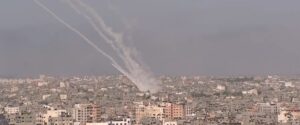- 847
- 907SHARES
New York Times columnist Nicholas Kristof followed his televised exchange on Bill Maher’s show with a column meant to push back on one of the points made by the host. “Gaza fired 4,000 rockets into Israel,” Maher told Kristof. “What would you say Israel should have done instead of what they did?”

New York Times columnist Nicholas Kristof.
Again later, Maher asked his guest: “What if Canada fired 4,000 rockets into America?”
Kristof didn’t directly answer the questions. “How do we avoid a war when someone is shelling– your neighbor is shelling you? That’s hard,” Kristof responded. But he tried to do better in his New York Times piece.
The columnist probably should have left it at “That’s hard.”
In his column, Kristof acknowledged that the U.S. has indeed responded militarily to attacks on the country—he named the Pancho Villa Expedition and the post-9/11 wars in Iraq and Afghanistan, arguing that in retaliation in these cases “didn’t work out” for America. (He might have also considered the Barbary Wars, the U.S. response to Pearl Harbor, the 1986 strike on Libya, or the international community’s response to Saddam Hussein’s invasion of Kuwait for a more rounded look at when military retaliation is effective).
Kristof then promised readers a list of other countries that “have dealt with attacks far more judiciously.”
Apologia for Hamas Violence
Before that, though, Kristof offered what amounted to a justification of Hamas’s war crimes. “The question of how the U.S. would respond reflects a myopia about the origins of Hamas shelling,” he wrote. (Does the columnist really believe that an attacker’s pretext or purported grievances should determine how to handle illegal and deadly attacks on civilians? It’s hard to imagine police officers asking to read a mass shooter’s manifesto before deciding whether to take decisive action to stop the shooting.)
Why does Kristof think it’s myopic to ask Americans what an appropriate response to attacks on civilians might look like? He turned to Sari Bashi, an anti-Israel activist who recently had brazenly lied to readers about Israel’s vaccination campaign, to explain: “Israeli officials did not wake up one bright morning to find thousands of rockets raining down,” Bashi tells us. In her account, Israel made Hamas do it. The country “created a provocation,” she said, because it “used violence” against Palestinians in Jerusalem and “stormed” a sensitive religious site. (That’s how she described clashes between Palestinian rioters and Israeli police.)
Israel “threatened to forcibly transfer Palestinian families from their homes as part of an official polity to ‘Judaize’ occupied East Jerusalem,” she continued (That’s how she described the possible eviction of a several families for refusal to pay rent in a part of the city where Arab population growth has long outpaced that of the Jewish population.)
In one sense, though not the one she intended, Bashi was right: Israel didn’t suddenly “wake up” to Hamas rocket attacks on May 10, when the barrages that started the recent fighting began. In fact, Hamas had also attacked Israel the previous month, including on April 24th when it fired 36 rockets at Israelis. Those rockets were fired before the clashes on the Temple Mount that, in Bashi’s telling, justified the rocket fire. (And of course, the group has continuously attacked Israel since its founding in the late 1980s.)
But let’s say Hamas really did fire rockets at Israel because of the Jerusalem clashes or in response to some other purported grievance, and not, as some suggest, to gain favor after Palestinian leader Mahmoud Abbas cancelled the Palestinian elections. And let’s ignore, as Kristof does, the steps Israel took to diffuse tensions. Would any of that mean that “the question of how the United States would respond if Canada started shelling Seattle seems misplaced,” as Kristof again argues? Japan had grievances before bombing Pearl Harbor. Saddam Hussein pointed to justifications for his takeover of Kuwait. Hitler, too, had his list of grievances.
Again for a third time, the author pleads with readers not to consider how they might want their government to respond if rockets from a foreign government landed on their homes. It’s myopic, he says. It’s misplaced. And then, as if it settles the matter, “Israel deliberately nurtured Hamas in the first place.”
Not only is this completely irrelevant to the question of how best to respond to rocket attacks, but it’s also specious.
As CAMERA’s Alex Safian noted in response to a 2014 Kristof column (which is strikingly similar to his current column),
Israel never encouraged Hamas or its Islamist rival Islamic Jihad. Israel supported the building of clinics, mosques and religious schools in the territories because this was their obligation under the Hague Regulations and the Geneva Conventions, which required that taxes collected in the territories be used for the benefit of the territories, and that existing laws, which included the funding of religious institutions, be maintained. Among the groups the government cooperated with in this regard was the so-called Muslim Brotherhood, a non-profit registered in Gaza. The Muslim Brotherhood, while rejecting the existence of Israel, was explicitly non-violent in those days, believing that Islamic society would have to be strengthened over the long term before any conflict could be initiated with Israel. (See, for example, Islamic Fundamentalism in the West Bank and Gaza, Ziad Abu-Amr.)
…
When the intifada began, the Muslim Brotherhood feared a loss of influence and popularity to the terrorist Islamic Jihad, which had openly mocked the movement for its non-violent stand. In response, under the leadership of Sheikh Ahmed Yassin, the Muslim Brotherhood created on December 9, 1987 a subgroup eventually called Hamas, which was meant to compete with Islamic Jihad in murdering Israelis. That is, contrary to Kristof, Hamas essentially did not exist until 1988, and Israel never cooperated with it.
Indeed, in May 1989 Israel arrested Sheikh Yassin and sentenced him to 15 years in jail for his role in the abduction and murder of two Israeli soldiers (Islamic Fundamentalism, p 65).
Kristof closes this portion of his column by again allowing Bashi to legitimize Hamas’ rocket attacks, or in her parlance, “resistance” by “armed groups.” Bashi insists that, instead of imagining how America might respond to rockets from Canada, we should instead ask, “What would the U.S. do if it conquered and occupied British Columbia, and then Canadian armed groups, resisting the occupation, shelled Seattle?”
But even Bashi’s selective analogy doesn’t do much to change the answer to Maher and Kristof’s thought exercise. Nor does her dubious claim that Gaza is “occupied.” (Israel fully withdrew from the territory, and international legal experts including Marko Milanovic, Yuval Shany, Hanne Cuyckens, Eyal Benvenisti, Ruth Lapidoth, Eugene Kontorovich, and Solon Solomon have argued that Gaza is no longer occupied). The U.S. occupied Iraq in 2003. If Iraqi terrorist groups responded to that by using Cuba as a base to fire indiscriminate rockets at civilians in Miami, not only would American military force against Cuba be legal under international law, but it would likely be seen as a moral imperative.
Kristof’s Counter-Examples
Finally, Kristof gets around to the promised examples of other countries that, in his view, should be a model for Israel.
“India and Afghanistan have repeatedly suffered terrorist attacks plotted in Pakistan; one such series of attacks in 2009 in Mumbai killed 164 people,” Kristof writes. “India did not respond by shelling Lahore or Islamabad but with diplomacy.”
Even in the author’s telling, there are immediate, glaring differences between the cases. While the Mumbai attack was “plotted in Pakistan,” it wasn’t plotted by Pakistan. It wasn’t conducted by the Pakistani government, but rather by a terror group that, at least nominally, is banned by the government. Pakistan went through the motions of arresting perpetrators of the attack.
By contrast, it was the government of Gaza that attacked Israel. Hamas, of course, has not banned Hamas. Of course the group hasn’t arrested its own leadership or fighters. The idea that Israel could have responded to Hamas rocket attacks by convincing it to do any of the above is pure fantasy.
And as Kristof himself noted, despite any diplomacy, India “repeatedly” suffers from terror attacks. Diplomacy fortunately averted war after the Mumbai attack, but it hasn’t pacified the terror groups who attack India.
The terror threat to India, moreover, hasn’t include endless barrages of rocket fire from inside Lahore or Islamabad, which is what Israel faced from Gaza. It’s not hard to predict, though, what would happen if Pakistani troops opened fire at Mumbai from positions in Lahore. In the past, when government forces have fired on the other side, neither India nor Pakistan have hesitated to respond militarily. Kristof ignores the most recent example, but this is precisely what happened when the sides shelled each other in late 2020. Kristof also ignores the months of deadly fighting between the countries in 1999, during which India successfully recaptured the Kargil district from Pakistan. Diplomacy sometimes yields results in international affairs. Other times, military action is deemed necessary.
When “Spain suffered brutal terrorists attacks for decates from ETA Basque separatists,” Kristof argues, “Spain didn’t send troops to Basque Country, nor did it invade France (which ETA used as a base for terrorism). Instead, it gritted its teeth and granted autonomy to the Basque Country.”
This second analogy, too, fails. First of all, Spain did use military force against the ETA. In the 1980s, its government established the GAL, a paramilitary group that carried out violent and fatal attacks on the French side of the border. The country also established two units, the UEI and UAR, that engaged in armed anti-terrorist operations against the ETA in Basque Country. So contrary to what Kristof told readers, Spain did effectively invade France. And it didn’t “send troops” to Basque Country because it had a gendarmerie force working there.
Both Spain and France carried out widespread arrests on ETA militants, something Kristof surely understands would lead to deadly fighting if Israel attempted to do the same in Gaza.
An eventual agreement with a weakened ETA was possible, moreover, because the ETA’s guiding mission wasn’t the elimination of Spain, unlike Hamas, whose antisemitic charter demands the violent destruction of Israel.
Likewise, in Northern Ireland, the British used militarized police forces to combat terrorism; the IRA wasn’t sworn to the destruction of the United Kingdom; and the IRA was eventually willing to negotiate a settlement with the United Kingdom. At any rate, Gaza today has a greater degree of self-rule than Northern Ireland was granted under the Good Friday agreements that Kristof cites as a model for Israel.
Most of all, though, it is strange to see Kristof point to diplomacy, gritting teeth, and granting autonomy as some sort of profound lesson for Israel. Israel has engaged in extensive diplomacy with the Palestinians, which led not only to a self-government authority for an overwhelming majority of the Palestinian population in the West Bank and Gaza Strip, but also to repeated offers of independence, which Palestinian leaders turned their backs on. And, alas, that diplomacy was no more successful than the U.S. operation to capture Pancho Villa. Rounds of negotiations have been quickly followed by Palestinian campaigns of violence. The most groundbreaking negotiations, in Oslo in the mid-1990s and at Camp David in 2000, preceded the worst round of terror that Israel has ever faced.
Successful diplomacy is certainly preferable to war. (Perhaps Kristof might have directed his column at Hamas?) Still, the idea that military action is unique to Israel and the US, or that armed state power hasn’t succeeded at combatting violence, is strange. Policing—which, again, isn’t an option for Israel in Gaza—has been largely effective against the Liberation Front of Quebec, the Black Liberation Army, and the 23rd of September Communist League, for example; military force has been effective against the PLO, the Revolutionary United Front in Sierra Leone, the Tupamaros in Uruguay, al-Ittihaad al-Islami, ISIS, and others.
Kristof admits that his analogies are inexact and imperfect. So are the above cases. But he avoids reckoning with examples like in the latter set because they paint a more complex picture than the one he hopes to sell. The more complex picture is one in which diplomacy (when there are two parties willing to compromise), policing (when possible), and military force have all had mixed records of success against terrorist groups.
Does any of this prove that Israel shouldn’t strike back at groups in the act of firing rockets into its cities, or that the U.S. shouldn’t do the same in a similar scenario?
Dogmatic Anti-Israelism
If a fair and full exploration of the similarities and differences between Israel and other countries under attack isn’t what guided Kristof’s column, then what was? A hint is offered by the following passage:
Every time Hamas shells Israel, it makes a solution less likely. And every time Israel grabs more land or kills more children, it likewise makes peace less achievable. Extremists on each side empower those on the other.
The framing is stunning and telling. Kristof describes Hamas—a virulently antisemitic terrorist group that not only killed Israeli children in recent weeks, but also has a long history of precisely targeting children with suicide bombs—as merely “shelling Israel.” By contrast, he tells readers that Israel is guilty of “killing children.”
Kristof’s language here suggests deep hostility toward Israel and a lack of concern for the country’s citizens. And it betrays an indulgence of Hamas, its eliminationist goals, and its murderous violence.
It is through that prism that empathy for Israelis under fire seems “myopic” or “misplaced.” By practically begging Americans not to imagine how they might react if indiscriminate rockets rained on their cities and towns, Kristof seems to hope for the rest of us to be so short-sighted, too.


